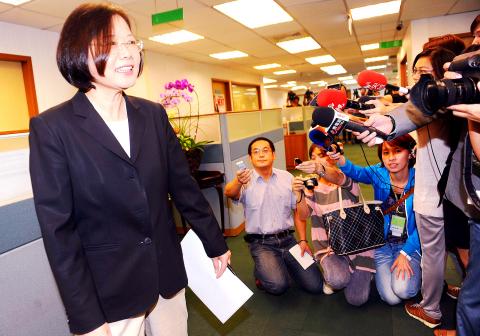Democratic Progressive Party (DPP) Chairperson Tsai Ing-wen’s (蔡英文) US visit has apparently boosted her support rate as the latest opinion poll conducted by the party showed its presidential candidate is leading President Ma Ying-jeou (馬英九) by 1.5 percentage points, the DPP said yesterday.
The survey, conducted on Monday, showed that 44.3 percent of respondents support the pairing of Tsai with DPP Secretary--General Su Jia-chyuan (蘇嘉全), while 42.8 percent support President Ma Ying-jeou (馬英九), who is seeking re-election, and his running mate Premier Wu Den-yih (吳敦義).
If People First Party Chairman James Soong (宋楚瑜) enters the race, Tsai would still lead Ma by 1.2 percentage points, with Soong receiving 12.4 percent support, the survey found.

Photo: Chang Chia-ming, Taipei Times
The poll showed 45.3 percent of respondents agree that Tsai had a successful US visit, while 16.1 percent disagree.
The poll collected 858 samples and has a margin of error of 3.4 percent.
In another survey released yesterday by Global Views magazine, Ma held a small lead, receiving 39.2 percent compared with Tsai’s 38.3 percent, in a head-to-head battle.
However, Tsai edged Ma by 0.2 points — 36 percent to 35.8 percent — in a three way race, with Soong finishing last with 10 percent.
Meanwhile, DPP spokesman Lin Chun-hsien (林俊憲) said the party would decide by public opinion poll by Saturday on a legislative candidate for Greater Taichung’s seventh district to replace Chien Chao-tung (簡肇棟), who has withdrawn from the race after his involvement in a hit-and-run car accident that killed one person.
Lin said a survey will be conducted to determine the candidate between five hopefuls: Taichung City councilors Ho Hsin-chun (何欣純) and Lee Tien-shen (李天生), and former DPP legislators Lin Feng-hsi (林豐喜), Chiu Tai-san (邱太三) and Hsieh Hsin-ni (謝欣霓).
Chien’s replacement will be decided in time for the DPP’s three-in-one campaign activity to be held on Saturday in Greater Taichung.
The event will include the DPP’s party congress, the celebration of its Sept. 28 party anniversary and a rally for January’s presidential and legislative elections.

CHANGING LANDSCAPE: Many of the part-time programs for educators were no longer needed, as many teachers obtain a graduate degree before joining the workforce, experts said Taiwanese universities this year canceled 86 programs, Ministry of Education data showed, with educators attributing the closures to the nation’s low birthrate as well as shifting trends. Fifty-three of the shuttered programs were part-time postgraduate degree programs, about 62 percent of the total, the most in the past five years, the data showed. National Taiwan Normal University (NTNU) discontinued the most part-time master’s programs, at 16: chemistry, life science, earth science, physics, fine arts, music, special education, health promotion and health education, educational psychology and counseling, education, design, Chinese as a second language, library and information sciences, mechatronics engineering, history, physical education

The Chinese military has boosted its capability to fight at a high tempo using the element of surprise and new technology, the Ministry of National Defense said in the Quadrennial Defense Review (QDR) published on Monday last week. The ministry highlighted Chinese People’s Liberation Army (PLA) developments showing significant changes in Beijing’s strategy for war on Taiwan. The PLA has made significant headway in building capabilities for all-weather, multi-domain intelligence, surveillance, operational control and a joint air-sea blockade against Taiwan’s lines of communication, it said. The PLA has also improved its capabilities in direct amphibious assault operations aimed at seizing strategically important beaches,

New Taipei City prosecutors have indicted a cram school teacher in Sinjhuang District (新莊) for allegedly soliciting sexual acts from female students under the age of 18 three times in exchange for cash payments. The man, surnamed Su (蘇), committed two offenses in 2023 and one last year, the New Taipei District Prosecutors’ Office said. The office in recent days indicted Su for contraventions of the Child and Youth Sexual Exploitation Prevention Act (兒童及少年性剝削防制條例), which prohibits "engaging in sexual intercourse or lewd acts with a minor over the age of 16, but under the age of 18 in exchange for

The High Prosecutors’ Office yesterday withdrew an appeal against the acquittal of a former bank manager 22 years after his death, marking Taiwan’s first instance of prosecutors rendering posthumous justice to a wrongfully convicted defendant. Chu Ching-en (諸慶恩) — formerly a manager at the Taipei branch of BNP Paribas — was in 1999 accused by Weng Mao-chung (翁茂鍾), then-president of Chia Her Industrial Co, of forging a request for a fixed deposit of US$10 million by I-Hwa Industrial Co, a subsidiary of Chia Her, which was used as collateral. Chu was ruled not guilty in the first trial, but was found guilty